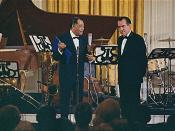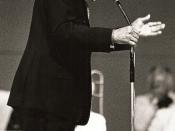Composer, bandleader, and pianist, Born Edward Kennedy Ellington in Washington, D.C., Ellington developed his keyboard skills by listening to local black ragtime pianists; he composed his first piece, "Soda Fountain Rag," around 1915. A successful professional musician by the early 1920s, he left Washington in the spring of 1923 for New York, which was his home base for the rest of his life. Between December 1927 and 1931 his orchestra held forth at Harlem's Cotton Club, where regular radio broadcasts, together with an active recording schedule, helped him establish a nationwide reputation.
In such compositions as "Black and Tan Fantasy" (1927), "Mood Indigo" (1930), "Solitude" (1934), and "Echoes of Harlem" (1935), Ellington emerged as a distinctive composer for his ensemble, employing the rhythms, harmonies, and tone colors of jazz to create pieces that vividly captured aspects of the African-American experience. At the same time he sought to broaden jazz's expressive range and formal boundaries in such extended works as Reminiscing in Tempo (1935), Black, Brown, and Beige (1943), and Harlem (1951).
An essential feature of Ellington's composing method was to write with specific instrumentalists in mind, often drawing them into the creative process by building entire pieces out of their musical ideas. This practice began in the 1920s, with Ellington drawing inspiration from such players as saxophonists Johnny Hodges and Otto Hardwick, trumpeters Bubber Miley and Cootie Williams, and trombonist Joseph Nanton. Another important contributor to the Ellington orchestra's sonic identity was the composer and arranger Billy Strayhorn, who worked closely with Ellington from 1939 until his death in 1967. Strayhorn was responsible for the band's famous theme, "Take the A Train" (1941), and in later years collaborated with Ellington on such projects as Such Sweet Thunder (1957) and the Far East Suite (1966).
During the 1930s Ellington began the...
![[Portrait of Duke Ellington and Sonny Greer, Aquarium, New York, N.Y., ca. Nov. 1946] (LOC)](https://s.writework.com/uploads/6/61491/portrait-duke-ellington-and-sonny-greer-aquarium-new-york-n-thumb.jpg)

